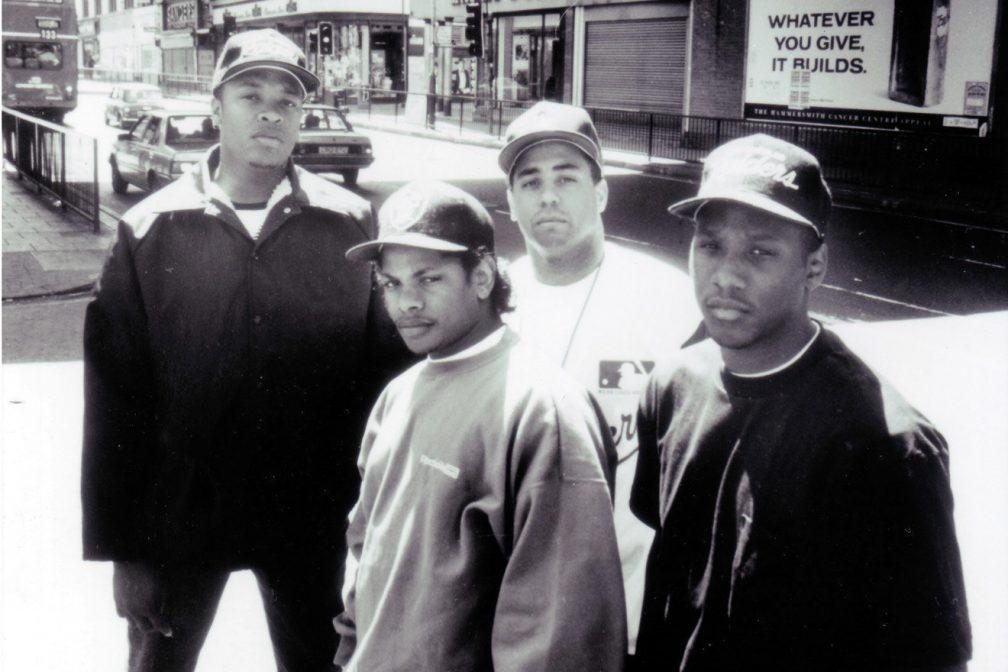 Features
Features
How N.W.A 's Powerful Hip Hop Changed The Genre Forever
We talked to Ice Cube of N.W.A about the real story of "the world's most dangerous group"
At a time when a sanitised depiction of a corrupt hip hop record label is America's most wanted TV show, the empire state of hip hop in 2015 is a far cry from its origins as a form of expression for street poets to vent about everything from poverty and prejudice to police brutality. The release of Straight Outta Compton, the new N.W.A biopic, is an explosive trip back to a time when 'the world's most dangerous group' wreaked havoc on the global consciousness with their searingly honest lyrics about growing up in South Central LA at the height of the city's crack cocaine epidemic in the late 80s.
As Britain basked in the peace, love and doves of acid house, an altogether darker movement was fermenting in LA. Pimps and pushers were kings, and the festering frustration of a group of young black men facing seemingly inevitable futures as drug dealers was at the forefront of a movement that would become known as gangsta rap.
"We actually never referred to ourselves as 'gangsta rap'", recalls Ice Cube. "That was a term invented by the media for what we were doing. We actually called it 'reality rap' because it reflected what we were going through. We felt backed into a corner, and that nobody cared about our situation and that our only weapon was our music."
N.W.A began life in 1986 when Compton drug dealer Eazy-E sought retirement from the 'thug life' following the shooting of his cousin. Having earned an estimated $225,000, Eazy decided to invest in the hip hop game and founded Ruthless Records alongside record executive Jerry Heller. Heller arranged a meeting between Eazy and Dr. Dre, a local producer/rapper he had seen gigging in clubs. Inspired by Public Enemy and Ice-T, Dre had big ideas but lacked the financial means to make them a reality – an alliance with Eazy was mutually beneficial. Together with local MCs Ice Cube and Arabian Prince and Dre's Wreckin' Cru bandmate DJ Yella, the collective of rappers and producers began cutting records to distribute locally.
They were uncompromising in every aspect right down to their name, deciding they would be called N.W.A – Niggaz With Attitude. "We were taking a word that had been derogatory to black people for years and deciding to use it instead of allowing ourselves to be abused by it," says Ice Cube. "When we started out doing music, it was an underground thing. We never thought it would be on the radio or on the TV. We thought that we were just making music for our homies. We thought we'd be 'hood stars; that a guy on our block would play it and tell his friend and he'd dig it and word would get around that way. That was as far as we ever saw our careers going."
The group honed their skills reworking popular tracks into explicit versions while supporting established acts such as MC Hammer and Salt'N'Pepa. Local radio stations also picked up on them, playlisting tracks suck as Panic Zone and Eazy-E's solo track 'Boyz N The Hood'.
Buoyed by their increasing success and infamy, the group, now with new member MC Ren, began work on their debut studio album, 'Straight Outta Compton', completing the album in just six weeks at a total cost of just $8,000. The album's lyrics were steeped in brutal realism and set over a cacophony of samples, sirens, scratches, beats and loops.
Upon its release in August 1988, the album was met with a barrage of controversy due to its explicit lyrics, condemned by everyone from the US President to the FBI (who accused them of inciting violence against police officers). Tracks such as 'Gangsta Gangsta' and 'Fuck Tha Police' were widely discussed in the media, and the group was forced to refute allegations that it "glamourised gang violence and profanity", maintaining that the themes of their lyrics were descriptions rather than endorsements.
However, their message was often overlooked and N.W.A achieved a level of fame and notoriety that sent their record sales soaring. As well as speaking directly to the black kids who were living the lifestyle depicted within 'Straight Outta Compton', its aggression and rebellion appealed to a white middle-class audience who embraced the album's ability to shock and horrify their parents.


